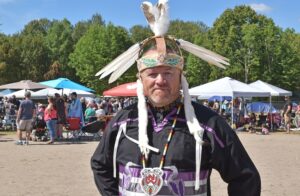Indigenous communities first up in second round of vaccines

By Kelly Anne Smith
NIPISSING FIRST NATION – “Indigenous communities are going to be involved in the second round as a priority,” stated Nipissing First Nation Chief Scott McLeod after the Assembly of First Nations (AFN) Annual General Assembly wrapped up Dec. 9.
“The first round of vaccines are going to be given to the frontline workers and the most vulnerable— Elders homes,” said Chief McLeod about the vaccines for the coronavirus disease 2019 (COVID-109).
He points out that Ontario Regional Chief RoseAnne Archibald is on the Vaccine Distribution Task Force.
“She has a lot of insight. She has done a great job informing the Chiefs of Ontario about how this thing is going to roll out and voicing our concerns. But at the end of the day, the decisions get made by federal higher-ups in the Canadian government.”
Chief McLeod says concerns were raised with the federal government about protecting everyone in Nipissing First Nation.
“When we talk about Indigenous communities, we’re not just talking about Indigenous people. We have a number of non-Indigenous spouses in our community. We have non-Indigenous lessees that occupy some of our land that are residents in our community.”
Chief McLeod was told all of the community members are the same, but was not given a clear answer as to how that will be done.
“I raised this issue with Minister Bennett. In that first round, we were told that seniors with pre-existing conditions and other individuals with pre-existing conditions will be in the first round. But it dosen’t talk about Indigenous people in that category,” he says. “More or less, the assumption is that they will be left to the second round. So, I raised this point. She did indicate that this would have to be looked at in more detail.”
Chief McLeod recalls the exchange.
“Her first reaction was that, ‘Well, you know, it doesn’t make sense to go to your community to service that group and then come back to do the rest.’ There are still some glitches that I see that could be coming up that we have to address,” he notes. “I indicated that Indigenous People have often been at the back of the line for just about everything. It would be nice to see Indigenous communities at the front of the line for this.”
Making sure everyone is protected from COVID-19 might be a challenge for Nipissing First Nation says Chief McLeod.
“The other problem too, is that not all of our members reside on reserve. They may be in Ottawa, Toronto, Calgary, Vancouver, wherever, so how we get to them is another issue.”
Chief McLeod says that there are a lot of moving parts to think about.
“It’s a matter of staying vigilant and keep pressing government to make sure that the needs of my community are met entirely, not just partially,” he expresses. “I’m reluctant to put my community before anyone else’s but that is the nature of Indigenous people. We’ve been at the back of the line. Any movement forward will be appreciated and accepted.”
With Attawapiskat First Nation members in the north isolating and recently dealing with five cases of COVID-19, Chief McLeod is empathetic.
“When you look at the statistics, it’s usually the communities that are in the most despair that get hit with these things the hardest. Indigenous communities are not different. My heart goes out to community leaders and community members in the far north, especially being so far from any health services. It’s very problematic. In those remote communities, it can be devastating.”
Shamattawa First Nations in Manitoba has a 70% positivity rate with 313 of 1,300 members testing positive on Dec. 11.


